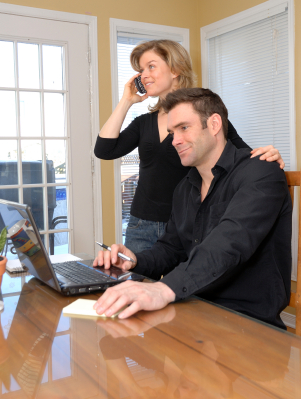Buying Your First Home, The Survival Guide: Calculating Costs
By Stevie Duffin Updated on 7/20/2017Editor's Note: This article is the second in Lender411's Buying Your First Home, The Survival Guide trilogy. Skip to the first entry, Getting Pre-Approved or the third, Choosing a House.
Part Two: Calculating Costs
 Following mortgage loan pre-approval, you will have an estimate of how much capital is backing your purchase.
Following mortgage loan pre-approval, you will have an estimate of how much capital is backing your purchase.
Estimate affordability.
As a general rule, the cost of your home should not exceed three times the amount of your gross annual income.
You may feel giddy when a lender pre-qualifies or pre-approves you for an amount that is greater than the number you were expecting. But decide on a price range that is realistic: what can you afford? Be aware of your Monthly Discretionary Income.
Calculate by subtracting payments you make every month from your net monthly income. From there you can decide how much you can pay.
Next, consider the Loan-to-Value ratio (LTV). A borrower's LTV is the cost of the mortgage loan weighed against the value of the desired home. If the home is worth $300,000 and you have secured a loan for $225,000, your loan-to-value ratio is 75%; the amount of the loan comprises 75% of the home's value.
When securing a loan, lenders prefer issuing loans to borrowers with lower LTV ratios, as borrowers with a low LTV assume more risk upon themselves, alleviating the lender. While many first time home buyers will not have the cash reserves to pay a substantial down payment and achieve a low LTV, you should be aware of your LTV ratio for future mortgage insurance considerations.
Another useful tool for assessing your financial standing is your Debt-to-Income Ratio, or DTI (recurring monthly debt divided by gross monthly income). This can also be done with several free calculators online and will be calculated by your lender.
Having a DTI of 33% max is typically best for financing qualification, but other high points in your financial records, such as a solid credit score, can certainly compensate.
Decide on a down payment.
Try to pay 20% down on your home as this will lower your monthly mortgage payment. It will save you thousands of dollars over the life of your loan since it eliminates the requirement for private mortgage insurance. However, for first-time buyers, this is often unrealistic.
There are options (such as FHA) available with minimum down payment as low as 3.5%. If you have served in the military, you may qualify for a VA loan and have the option to put nothing down. It is wise to mull over these scenarios with your mortgage pro and figure out what's best for your financial situation.
Be aware of fees.
In addition to a down payment, there may be up-front costs, and there will be closing costs. Ask your lender for a Good Faith Estimate, which will provide an accurate and detailed list of potential closing cost amounts and other fees associated with securing a mortgage loan.
If you move forward with the loan and decide to lock-in on a particular interest rate, request confirmation of the lock-in in writing. Without a written confirmation you may find your lender will try to hike up the rate and blame the market.

Didn't find the answer you wanted? Ask one of your own.
-
 Common Homeowners Association Questions, Answered
View More
Common Homeowners Association Questions, Answered
View More
-
 Buying a Home for the First Time and Completely Totally Lost - Until Now
View More
Buying a Home for the First Time and Completely Totally Lost - Until Now
View More
-
 How to Prepare For a Mortgage Like a Pro
View More
How to Prepare For a Mortgage Like a Pro
View More
-
 How to Stop Paying Rent
View More
How to Stop Paying Rent
View More
-
 What Is Mortgage Escrow?
View More
What Is Mortgage Escrow?
View More
-
 Buying Your First Home, The Survival Guide: Choosing a Home
View More
Buying Your First Home, The Survival Guide: Choosing a Home
View More
-
 Buying Your First Home, The Survival Guide: Getting Pre-Approved
View More
Buying Your First Home, The Survival Guide: Getting Pre-Approved
View More
-
 7 Sins of First Time Home Buyers
View More
7 Sins of First Time Home Buyers
View More
-
 Tax Advice for First Time Home Buyers
View More
Tax Advice for First Time Home Buyers
View More
-
 FHA Loans for First Time Home Buyers
View More
FHA Loans for First Time Home Buyers
View More
-
 Loan Programs for First Time Buyers
View More
Loan Programs for First Time Buyers
View More
-
 First Time Home Buyer Down Payment
View More
First Time Home Buyer Down Payment
View More
-
 Getting A Home: Your Guide To Common Questions
View More
Getting A Home: Your Guide To Common Questions
View More
-
 8 Expenses to Expect When You Purchase Your Home
View More
8 Expenses to Expect When You Purchase Your Home
View More
-
 First Time Home Buyer Loans
View More
First Time Home Buyer Loans
View More
Related Articles
Ask our community a question.
Searching Today's Rates...

Featured Lenders
Lisa Stepp
RBS Citizens
Clifton Park, NY
Kat Whitman
Whitman Met, Inc.
Sacramento, CA
Cameron Burke
Vision One Mortgage
Huntington Beach, CA

